- Home
- Beth Vrabel
Bringing Me Back Page 4
Bringing Me Back Read online
Page 4
I shot up so fast the stool fell backward, clattering to the ground as Jeff hopped out of its way. I rammed past him, hitting him with my shoulder. But I didn’t have anywhere to go, so I just took a new seat in the waiting room. The seats are comfier there, anyway.
I squeezed shut my eyes, but couldn’t mush out Jeff’s words, stop them from rattling around my head.
Next to me, this tiny twerp squirmed in his chair, humming a Sesame Street song about counting to three and pushing buttons on his mom’s cell phone. The mom sat with her arms crossed, glaring alternately at the garage bay where her minivan was getting tuned up and the clock, which seemed to be moving extra slow for both of us. A baby in a carrier snoozed at her feet.
“A, b, c, d … ” The little kid started singing the alphabet. “h, i, j, k, Elmo doesn’t pee … q, r, s … ”
I glanced at the mom, but she didn’t smile or correct the kid. She didn’t even hear him, too busy glaring into the garage.
I put my head on my knees, trying to think of the bear, of Rina, of Landon, of anything but my mom. In that moment, I couldn’t even think of what I’d had for lunch that day, or what I’d gotten for Christmas last year, but somehow I could remember every bit of a throwaway hour with my mom when I was the squirmy preschooler in a waiting room chair. I could almost smell the lavender from her shampoo as she wrapped her arm around me to whisper in my ear. (Do they let you have special shampoo in jail?)
This was before we knew Jeff, but it was a repair shop a lot like this one. Walls covered in posters of motorcycles. Huge windows overlooking the workrooms. Coffee pot spitting in the corner. Mom beside me, not scowling toward the next room or distracting me with a phone. Leaning into me so we were one person on two chairs, whispering a story to me about talking cars that only listened to a certain little boy, waving off the mechanic and his clipboard when he said our car was ready. “Let me finish telling my boy a story,” she said, not looking away from me. My boy, that’s what she always called me.
CHAPTER FOUR
That Friday, Mr. Anderson called every Ashtown Middle School class to the auditorium. The space is alternately known as “the cafeteria” and “the gymnasium,” kind of a one-room-fits-all. Ashtown isn’t exactly a well-to-do town. Our county is top in the state for two things: the worst water quality and highest unemployment. So the school makes do a lot, including the all-purpose auditorium. Basketball hoops hung from two ends of the room, and we sat on the floor since the cafeteria tables were still stacked in the back. That morning, homeroom teachers had said that the assembly would be held outdoors, but then it started drizzling. It was pretty obvious the cafeteria workers weren’t happy about the change in plans. Ladies in hairnets hurried by with trays of chicken nuggets, and custodians stood by the stacked tables, waiting to spring into action.
“All right, students,” Mr. Anderson began from a little stage at the front of the room. “We have a few announcements as we kick off what is sure to be the best Ashtown Middle School year yet!” His voice boomed at the end and he pumped his fist in the air like he expected a chorus of hoots and cheers. Instead, a couple teachers clapped once or twice around the perimeter of the room.
Mr. Anderson then went over the same rules we’ve always had since the beginning of kindergarten. No hitting. No kicking. No back-talking. No cheating. Near the end of this annual speech, all of us started shifting, gathering up books and eyeing the door. Then Mr. Anderson took a deep breath, letting it out into the microphone so it puffed across the room, blanketing the fidgeting. “One more thing,” he said. “This year, I feel I need to emphasize something more. I want us all to be good citizens.” He said this part slower and quieter, which somehow made the words louder in my ears. “What does it mean to be a good citizen?”
Of course he didn’t really want an answer, but Rina’s hand shot into the air anyway. Mr. Anderson ignored her. “It means doing what’s right. What’s honest and good. Citizenship means seeing wrongdoing and doing your part to end it. It means to never, ever benefit from taking what’s not yours.” I couldn’t drop my head fast enough to miss Brenna’s face whipping toward me. “It means helping students when they need it and never, ever being cruel to those who are different.” Again I felt the heat of a hundred eyes on me. An image of Micah, crying, flashed behind my closed eyelids. I rubbed the heels of my hands into my eyes to scatter the picture, but I couldn’t block the crunch echoing in my ears. Mr. Anderson’s voice droned on. “We look out for our own and uplift rather than tear down. This year, more than ever before, I will personally be seeking out good citizens. And I will be doling out severe consequences when I see students being poor citizens. We’re just beginning a brand-new school year. It’s a fresh start. Let’s all act accordingly.”
Mr. Anderson’s gaze swept across the room, snagging on me for a beat too long. I shook my head a little. I think he seriously thought he was helping me out and reminding everyone to be nice to me, when really he was just highlighting all the reasons I was an outcast.
As everyone started shifting around again, Mr. Anderson held up a narrow hand. “To finish our assembly, some students would like to make a few announcements.”
At that, four girls headed to the stage, Brenna leading the way. They wore Ashtown Bruins cheerleading uniforms, and each carried a bucket. They giggled in that annoying girls-who-know-everyone-is-watching way. I nearly sighed, but Rina, seated two rows ahead of me, saved me the trouble. A little buffer of space separated Rina, just like the bubble around me.
“So,” said Brenna, popping out her hip so her little cheerleading skirt flared. “You all know that, this year, we don’t have an Ashtown Bruins football team, even though last year we technically won the championship, right?”
Actually, technically the game was forfeited, thanks to me. I realized the crunching sound in my ears was my teeth grinding.
“Thanks to some poor citizenship, as Mr. Anderson would say”—she flashed a grin at the principal, who suddenly looked a little uncomfortable—“our team’s standing is gone, along with our coach.” Brenna and the other two girls popped out their bottom lips in stretched-out sad faces, and I threw up in my mouth a little. “But we’re not going to let that keep us down, right?”
Behind her, the other two girls spirit-fingered and cheered, “Right!”
They clapped and pranced around the stage, moving way too much for just piling the buckets into a little pyramid. “Here’s what we’re going to do, Bruins!” Brenna punctuated each word with a peppy little clap. “We’re going to fill our buckets!”
To their credit, most of the audience groaned, remembering the push in elementary school to “fill each other’s bucket with kindness.” Was this going to be some cheer-laden bucket o’ kindness drive?
“Here’s the deal,” snapped Brenna, dropping the façade for a second and speaking in her usual don’t-mess-with-me-or-I’ll-tell-my-mom tone. “At the end of this season, the League is having a meeting to plan next year’s teams. We’re going to apply to be reinstated!”
Mike and Landon hooted, and a bunch of other kids cheered.
“Now, for it to work, we’ve got to show we’re serious and ready to make big changes to avoid how things went last year! So we’re having a fund-raiser. We’re going to raise five hundred dollars!” Brenna shook her pom-pom for no apparent reason and jumped up and down a few times. “It will show the League that we get what happened was a big deal.” Pom-pom shake emphasis on big deal. “We’re going to donate all of the money to a charity of the League’s choice, in the League’s name. They chose MADD—Mothers Against Drunk Driving.”
All the air left my lungs with her sucker-punch words. I stared hard at the gym floor but couldn’t block out Brenna’s voice. “If you’re nominated by someone in the morning announcements, you’ve got twenty-four hours to dump a bucket of Gatorade over your head and donate $10 to the fund! It’s going to be so fun!”
“Gatorade?” Landon called out from the back of the room. F
ew kids in Ashtown, Landon especially, could afford full-priced Gatorades, let alone convince their folks to buy them just so they could dump them over their heads.
“Or any energy drink,” one of the cheerleaders chirped.
I glanced up at Brenna. She put her hands on her hips and stared at Landon. “It’s like when the football team won a game and the team would dump a cooler of Gatorade on the coach and sometimes even the MVP of the game.” I’d been MVP plenty of times, and I shuddered a little, remembering the shock of liquid and ice rushing in a wave over my head. Mom would grumble and laugh all at once about spreading a towel across the back seat before I could get in the car to go home—or, more likely, out for pizza to celebrate.
A few people around me shifted further away, like they knew what I was thinking.
“Well,” continued Brenna, hoisting up a huge poster from the stage floor with help from the other cheerleaders, “if you help us ‘Bring Back the Bruins,’ you’re our MVP!”
“Bring Back the Bruins” was plastered across the sign, with a bucket of orange stuff being dumped onto a cartoony bear mascot. To the side was a bigger, blank bucket with lines along the side, marked 100, 200, 300, and 400, with 500 written across the brim of the bucket. “Whenever we get a donation, we’ll fill in the bucket a little more! Mr. Anderson is letting us hang this in the hall.”
“Isn’t that kind of stealing?” Rina loudly asked. “I mean, from the ALS fund-raiser a few years ago.”
Brenna scowled at Rina, who smiled pleasantly back. “ALS used ice water. We’re using Gatorade.”
“Or any energy drink,” the other cheerleader piped in.
“Come on, everyone!” Brenna shook her pom-poms again. “We have until the League meeting—November fifth—to fill our bucket!”
November 5. The date circled in red and labeled FREE! on the calendar at the Shop.
“That’s less than three months, but we can do it!” Brenna and the other two girls clapped in sync and moved into a little triangle formation. In a chant, they said, “Give me a ‘B’! Give me an ‘R’! Give me a ‘U’!” The girls lost steam at the lame, splattered response. Someone in the back, an eighth grader who wouldn’t be able to play on the team anyway next year, shouted, “Give me a ‘Shut up!’”
But then Landon hopped to his feet. “Come on, guys!” he shouted. “Let’s do this thing!” He threw his arms out like he was fanning a fire upward.
Brenna grinned, and the girls repeated the cheer. This time, just about everyone hopped to their feet and shouted the team letters, ending with a booming, “Let’s go, Bruins!”
“First challenge: Mr. Anderson!”
I had to get out of there. As I snuck out of the room, one of the girls filled one of the buckets with generic energy drinks, while another spread a plastic tarp under a foldable chair. Brenna pulled a smiling, in-on-it-all-along Mr. Anderson from the crowd. He grinned and shook his head in protest, but trudged toward the chair, pulling two twenty-dollar bills out of his pocket.
I was halfway down the hall when I heard the splash and responding cheer.
Mr. Davies’s face flushed red. “Survival of the species depends on trial and error,” he spouted mid-lecture. He really got into this stuff. Even though it was the end of the day, he was as fired up as Jeff fresh from downing three cups of coffee. Mondays kick off with science. Fridays, the day ends with it. My schedule was created by the devil.
“The error leads to the gradual elimination of characteristics. The trial leads to leaps and bounds. Literally! Think, for example, of the first fish to develop legs!”
I couldn’t believe no one was calling him on out this bull. Like a fish one day just decided, “Okay, let’s sprout some legs!” And boom! Legs. I squeezed my teeth together so hard my jaw hurt to keep from raising my hand. I guess maybe Mr. Davies was right about something. Earlier he had said the urge for self-preservation supersedes all other instincts in an organism.
Mr. Davies kept right on going. “Now that guy had some bragging rights. Where would any of us be without him?”
“Or her,” Rina muttered.
“Right, right.” Mr. Davies smiled indulgently. “Yes, a female fish followed, of course, solidifying the evolutionary shift.”
If looks could kill, Mr. Davies would’ve been pulverized. “Or,” Rina said, “the female fish was first and the male fish followed. You know, if things happened as you say, with one fish one day popping out some legs instead of thousands upon thousands of tiny evolutionary shifts that eventually, over the course of generations upon generations, led to growth of leg pods.”
I choked on a laugh but heard a chuckle anyway. It was Landon, perched in the farthest seat from mine. Out of habit, maybe, his eyes locked with mine. Out of habit, again, I grinned back. Landon’s smile dissolved into a scowl.
“Yes.” Mr. Davies grimaced. “I was trying to explain the situation in a casual, fun way, Rina. But—”
A ping over the loudspeaker cut into Mr. Davies’s sure-to-be-witty reply. “Mr. Davies, sorry for the interruption. We need to see Noah Brickle in the office immediately.”
“But school lets out in five minutes,” I said.
“Better bring your backpack.” Mr. Davies smirked.
Miss Dickson’s bubblegum-pink lipstick was smeared in the corners, probably from twisting her lips together, trying not to look happy when kids get in trouble. “We have a seat when we are called to the Office, Noah,” she said.
I went to my usual spot—the empty seat outside of Mr. Anderson’s office.
“No, not that one. This one!” Miss Dickson pointed instead to the seat in the front lobby.
“What’s this about?” I asked.
Miss Dickson picked up the phone instead of answering, pointing to the chair and twisting her lips some more. She punched a few buttons on the phone and soon was ordering shipments of paper clips and copy paper.
I kept my eye on the clock. School let out in three minutes. Then I’d be free.
Miss Dickson added manila folders to the list. “The kind with varied tabs, not all tabs at the same spot. Yes, that’s important. Very important.” I was pretty sure the quality of Ashtown Middle School education depended on proper varied-tab manila folders.
One minute.
“Add three four-packs of dry board erasers. What? Since when? Okay, so I’ll take four three-packs … ”
Forty seconds.
“Yes, that’s it for now. Friday? Fine. We’ll make do with what we have until Friday.” Miss Dickson shook her head, like she was making a huge sacrifice, waiting a week for the erasers, folders, paper clips, and paper. She went to hang up the receiver, then jolted it back to her ear. “What do you mean you need the account number? It should be on file!” Her eyes, thick with mascara, flitted toward me.
“No … ” Her voice dipped. “No, I can’t give you the account number right now. I’ll need to call you back when I’m more … secure.” Now she openly glared at me.
I felt my face flame.
Thankfully the bell blared. Miss Dickson hung up as I rose to my feet. “See you Monday, Miss Dickson.”
“Get back here, Mr. Brickle. We are not dismissed!” She twisted her glossy lips.
“I’m going to miss my bus!” I stopped in the doorway, halfway in the office, halfway toward the exit. I could taste the freedom in the bus exhaust floating into the lobby.
“Don’t you lie to me, boy. I know you don’t take a bus. I’ve got eyes everywhere.” Miss Dickson got up so her palms pressed against her desk. “Get back to that seat.”
I slumped back. “What is this about?”
More lip twisting. “About this.” Miss Dickson slapped a pile of paperwork onto the desk. My name was written across the top, the rest of the forms blank. I sort of recognized the back-to-school forms, since I had a crumpled-up copy of each stuffed in the bottom of my backpack. “You failed to return a single form. They’re due back today.”
“I’ll bring them back Monday. Sorry,
Miss Dickson.” I grabbed them from the desk, but she tugged the papers back out of my hands.
“Too little, too late.” She jabbed an electric-blue fingernail back to the chairs. “I’ve already called your father. I mean, your guardian. You can’t leave until these forms are signed.”
“You what?” I groaned and threw my bag down on the chair. “Why would you do that?” The Shop is buzzing right after school, and I knew Jeff had a packed schedule. I helped book an appointment for a three-thirty oil change. No way would he cancel last minute just to fill out some stupid forms for me. Jeff wasn’t going to be here for at least a half hour. And when he got here, he was going to be mad.
Miss Dickson twisted her lips some more and pointed to the empty chairs. I slunk into one, arms crossed.
Ten minutes later, the door flew open and Mr. Anderson strode in, followed by Landon. “Another missed bus.” Mr. Anderson jabbed his thumb toward Landon, then jerked his chin toward me. “What are you doing here, Noah? Everything okay?”
Before I could say anything, Miss Dickson snapped, “I’ve got it under control, Mr. Anderson. I think you’re probably still needed at dismissal.” Right on cue, the clattering of books hitting the ground and someone cursing rang out. Mr. Anderson backed out of the office.
“Have a seat.” Miss Dickson pointed toward the only other empty seat in the lobby—the one right next to me.
“Aw, come on!” Landon slammed down his bag and turned so his body faced away from me.
Miss Dickson punched another couple of digits into her phone. “Yup, he missed the bus. Again.” She paused, glaring at Landon all the while. Again? I guess Landon always had been sort of forgetful. Like he never did his homework unless I bugged him about finishing before we went out to play ball. But he never missed the bus last year. I chewed my lip. Maybe he never missed because I had always been there, in the seat next to him. Miss Dickson sighed, breaking apart my thoughts. “All right. I’ll let him know.”

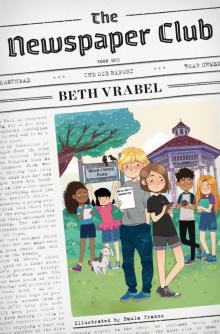 The Newspaper Club
The Newspaper Club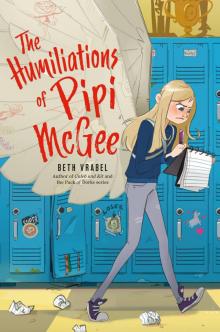 The Humiliations of Pipi McGee
The Humiliations of Pipi McGee Camp Dork
Camp Dork Pack of Dorks
Pack of Dorks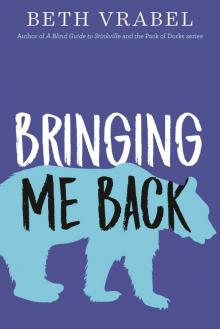 Bringing Me Back
Bringing Me Back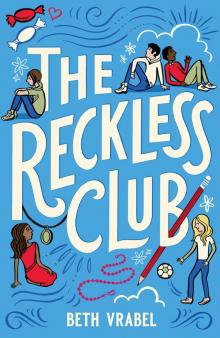 The Reckless Club
The Reckless Club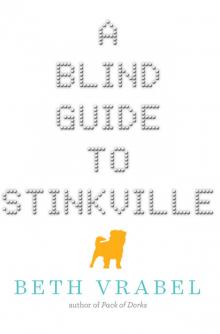 A Blind Guide to Stinkville
A Blind Guide to Stinkville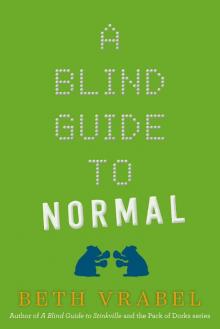 A Blind Guide to Normal
A Blind Guide to Normal Caleb and Kit
Caleb and Kit